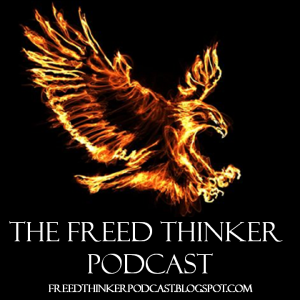Episodes

Monday Jul 01, 2019
Inspiring Philosophy and Aron Ra
Monday Jul 01, 2019
Monday Jul 01, 2019
In this episode I chat with Michael Jones from Inspiring Philosophy about his recent debate with atheist Aron Ra on the question, "Is Christianity Dangerous?"
Enjoy the show!!!
--------
Here are some excerpts from peer reviewed articles on the role of Atheism in Albania and the former Soviet Union:
From the article, “Violations of Freedom of Religion in Albania” by Barbara Frey, OPREE, vol IX, no. 6. 1989.
“Belying the Constitution, however, anti-religious activity commenced almost immediately after the new government was formed. In August 1945, the government passed an agrarian reform law which deprived religious institutions of much of their property. A series of show trials and executions were held, following which the Jesuit order was banned in 1946 and the Franciscans in 1947. In 1946, all Catholic priests, nuns, and monks were expelled. Many priests were imprisoned, executed, or assassinated.” pp4-5.
“At about the same time, the Ministry of Education banned the teaching of religion in state schools. In April 1947, the Party of Labor recommended introducing anti-religious teaching in schools. The government also attempted to halt religious instruction by clerics and lay-people even in homes.” p5.
“Once the statues were passed, criminal penalties which had formerly protected the constitutional guarantee of freedom of religion were removed from the Albanian Penal Code.” p5.
“Public meetings were held at which the public denounced the clergy and vowed never to practice religion again. People’s tribunals decided which public celebrations were religious in nature and how to replace them with appropriate national atheistic holidays. During public proceedings, crowds turned over their crucifixes, icons, bibles, and other religious items. Children whose fathers were priests denounced them as fakes, and “thunder sheets” (fletë-rrufe) were posted attacking those parents who had given religious names to their children.” p6.
“All possible signs of religion were eradicated. Graveyards and tombstones were cleared of religious symbols: only the Communist star was permitted. Religious phrases were attacked too: the term “P.K.” meaning Përpara Krishit (in English, B.C.) was replaced with “P.E.R.” for Para Erës Sëre (“Before the New Era)... Despite stated constitutional guarantees, the People’s Assembly passed Decree No. 4334 on 13 November 1967 (Published in Gazeta zyrtare on 22 November) which cancelled the legal status of religion... Radio Tiranë announced that Albania was now the “first atheist state in the world.” Religious freedom was removed from the statures; it would shortly be removed from the constitution as well.” p7.
Speaking of the 1976 Constitution:
“Article 37: The State recognizes no religion whatever and supports atheistic propaganda for the purpose of inculcating the scientific-materialist worldview.” p8.
“Article 55 of the 1977 Criminal Code: Fascist, anti-democratic, religious, warmongering or anti-socialist propaganda, as well as the preparation, distribution or the possession for distribution of literature with such a content in order to weaken or undermine the state of the dictatorship of the Proletariat are punishable by imprisonment of between three and ten years. If these actions occur in time of war or if they have caused particularly serious consequences, they will be punished with imprisonment of not less than ten years or with death.” p9.
“The government had already instituted another facet of it’s anti-religious campaign. On 23 September 1975, it passed administrative Decree No. 5339 (also the similar Legislative Decree No 5334...) which stipulated that, ‘Citizens who have inappropriate names and offensive surnames from a political, ideological, and moral standpoint are obliged to change them...’ therefore, it is legitimate to insist on the use of national names so that... the names of people do not become an indicator of the religious affiliations and divisions of yesteryear in the eyes of future generations.” p9.
--------------------------------
From the article, “Soviet Books and Pamphlets on the Theme of Atheism: Statistics and Crucial Points” by Paul Roth, OPREE, vol V, no. 4. 1985.
“Indeed, the Soviet constitution permits public atheistic propaganda but not religious propaganda. A religious book offered to the public would be an offense against the constitution. Thus, it is not surprising the Soviet authorities consider so-called “illegal” importation of Bibles into the Soviet Union as an offense against the laws of the state.” p9.
“Those books and pamphlets which belong to the categories ‘Marxism-Leninism,’ ‘Social Sciences,’ and ‘Philosophy, Sociology, Psychology’ are based on atheism. Those which belong to the category ‘Atheism and Religion’ are anti-theistic, often militantly atheistic, with the exception of those texts which are intended for export to foreign countries.” p10.
“Most of the titles, 17, are concerned with ‘atheistic education of the population’ (total number of copies 761,000)... Some publications deal especially with the question of how a person can accomplish atheistic education goals in mathematic classes by using films.” p14.
“In connection with the previously discussed group, we must also observe the following thematic category which presents ‘Atheism as a provision for a fulfilling life’ to Soviet citizens... Religion is presented as the reason for spiritual and intellectual problems. Religion is to be replaced by a life based on atheistic principles with an atheistic value system and holidays and rituals free of religious content.” pp16-17.
“If we attempt to draw a conclusion from the statistic taken from “New Books,” which, we reiterate, are obviously incomplete, we can state the following: 1) Clearly, atheistic literature in the Soviet Union belongs to the category of prescribed literature, not popular literature.”
------------------------
From the article, “The Current Situation of Religion in Albania” by Peter Prifti, OPREE, vol III, no. 3. 1983.
“Questioning the zeal, if not the integrity of critics of Albanian atheism, Hoxha said that there are hundreds of millions of people in the world who do not believe in religion. Why then all the astonishment at socialist Albania? He closed his defense by saying, ‘Our state is atheistic by the will of its people.’” p2.
------------------------
From the article, “Grave Violations of Religious Rights in Albania” by Gjon Sinishta, OPREE, vol III, no. 5. 1983.
“Enver Hoxha again set the stage for action with his infamous speech of February 6, 1967, urging the Albanian youth to fight “religious superstitions.” A ruthless campaign against all religions followed. Everywhere churches were burned or turned into sports arenas, dance halls, movie theaters, apartments, etc. Priests and bishops were publicly beaten. The Franciscan church of Arrmadhe in Shkodra, together with the Friary, was set afire one evening and four elderly Franciscans were burned to death. During 1967, according to the journal of Albanian writers, Nendori (November), about 2200 mosques, churches, chapels, monasteries and other religious buildings were vandalized and closed. Of that number, 327 were Roman Catholic. On November 22, 1967, the government published Decree No. 4337 ordering the annulment of the religious charters and of all laws pertaining to state-church relationships. All religious rites were prohibited and grave penalties were imposed on violators. The remaining priests were sent to forced-labor camps for ‘re-education.’ The Albanian Party and government boasted that it had become the first totally atheistic state in the world.” p13.
“With these articles Albania became the only country in the world where the suppression of religion and the propagation of atheism have become a constitutionally mandated state policy... Prior to the actual enactment of such official acts, the government manifested the same kind of suppression of religion. Fr. Stephen Kurti was executed in 1972 for baptizing a child in a labor camp at the parent’s request. In 1974 the government also sentenced the three remaining Catholic Bishops to detention camps for conduction religious services in private. Following the constitutional outlawing of religion, in 1977 Fran Mark Gjoni of Shkodra was brought to trial for the possession of Bibles. Gjoni admitted, when presented with the Bibles taked from his home, that he had found them in parks and at the seashore where they had been left by tourists or floated in by sea. For his ‘crime’ Gjoni was sentenced to 12 years in prison... For religious criminals such as Gjnoi, according to reports from recent refugees, the government has at least six prisons, nine concentration camps and 14 areas of external exile.” pp14-15.


Comments (1)
To leave or reply to comments, please download free Podbean or
Two of my absolute favorite people from two very different perspectives coming together I love seeing the work of God within Christ's sheep 😊
Monday Jan 25, 2021
To leave or reply to comments,
please download free Podbean App.